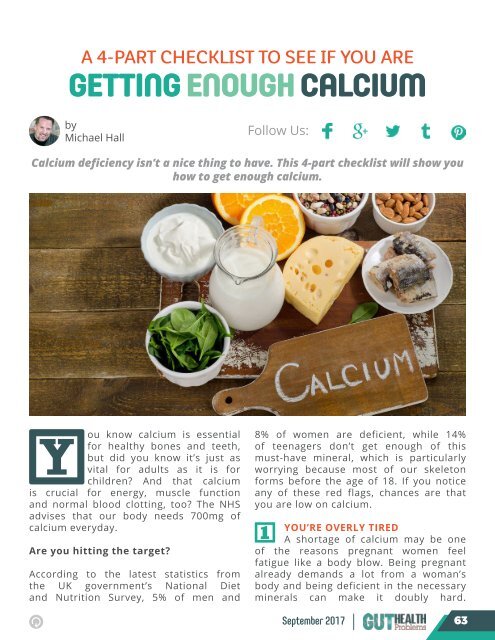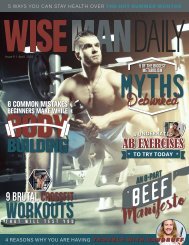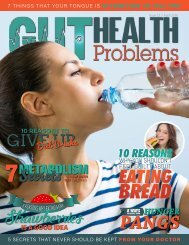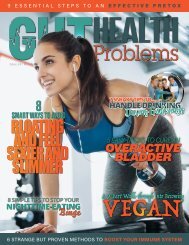Gut Health Problems - September 2017
In the eighth issue of Gut Health Problems, we have an overview of the vast benefits of probiotics, a checklist of foods rich in zinc, an intro to determining if you have fiber deficiency, and more. Intestinal discomfort, whether chronic or occasional, is something worth taking the time to prevent. And while we all have those foods that give us problems, you may actually be able to make a change that makes a bigger difference than you ever imagined.
In the eighth issue of Gut Health Problems, we have an overview of the vast benefits of probiotics, a checklist of foods rich in zinc, an intro to determining if you have fiber deficiency, and more. Intestinal discomfort, whether chronic or occasional, is something worth taking the time to prevent. And while we all have those foods that give us problems, you may actually be able to make a change that makes a bigger difference than you ever imagined.
Create successful ePaper yourself
Turn your PDF publications into a flip-book with our unique Google optimized e-Paper software.
A 4-PART CHECKLIST TO SEE IF YOU ARE<br />
GETTING ENOUGH CALCIUM<br />
by<br />
Michael Hall<br />
Follow Us:<br />
Calcium deficiency isn’t a nice thing to have. This 4-part checklist will show you<br />
how to get enough calcium.<br />
You know calcium is essential<br />
for healthy bones and teeth,<br />
but did you know it’s just as<br />
vital for adults as it is for<br />
children? And that calcium<br />
is crucial for energy, muscle function<br />
and normal blood clotting, too? The NHS<br />
advises that our body needs 700mg of<br />
calcium everyday.<br />
Are you hitting the target?<br />
According to the latest statistics from<br />
the UK government’s National Diet<br />
and Nutrition Survey, 5% of men and<br />
8% of women are deficient, while 14%<br />
of teenagers don’t get enough of this<br />
must-have mineral, which is particularly<br />
worrying because most of our skeleton<br />
forms before the age of 18. If you notice<br />
any of these red flags, chances are that<br />
you are low on calcium.<br />
1<br />
YOU’RE OVERLY TIRED<br />
A shortage of calcium may be one<br />
of the reasons pregnant women feel<br />
fatigue like a body blow. Being pregnant<br />
already demands a lot from a woman’s<br />
body and being deficient in the necessary<br />
minerals can make it doubly hard.<br />
<strong>September</strong> <strong>2017</strong> 63

















